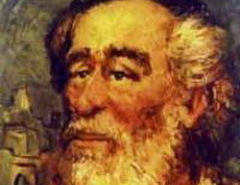
“If I decide to become an undertaker, people will stop dying,” is how Ibn Ezra wrote about his failures.
The famous Jewish poet, philosopher, Bible commentator, grammarian, astronomer, mathematician and physician Abraham Ben Meyer ibn Ezra was born in 1092 (according to other sources – 1089) in Christian Spain. He received a secular and religious Jewish education, was close to another famous Jewish poet and philosopher Judah Halevi, whose daughter, according to legend, he married.
Ibn Ezra lived in Spain until he was 48. Then he traveled extensively through North Africa and Egypt, and from 1140 – through Italy, France, and England. He wrote most of his works during the second period of his wandering life, and in violation of tradition, he created his secular works not in Arabic, but in Hebrew.
Abraham Ben Meyer ibn Ezra, according to the recollections of his contemporaries, was a wise, sympathetic, unpretentious and witty man. All his property was “the clothes on him, and a bag with an astrolabe, and a brave heart and the spirit of God in him.”
His “comic songs” and many epigrams attributed to him are marked by wise humor and sometimes sarcasm. As a poet, Ibn Ezra, contrary to the canons of classical Jewish poetics, was close to folk traditions. His use of a form of dialogue in his poems, in which animals, inanimate objects and even abstract concepts participated, was also innovative. His poems are dedicated to friendship, love and nature. He also wrote about the misfortunes that befell his associates, sometimes throwing reproaches at the Almighty himself:
“They were your children, but now they are no longer?
Why did you consign them to oblivion for a thousand years?
After all, they are surrounded on all sides by ill-wishers.”
At the same time, Ibn Ezra is known as one of the last Jewish poets in Spain who wrote poetry for worship. “The poems used in prayer,” he wrote, “should be accessible to the people.”
In his philosophical views, set out in the “Basis of Reverence” and other works, Abraham Ben Meyer ibn Ezra followed Neoplatonism, inspired in many ways by the ideas of Muslim thinkers and his compatriot Solomon ibn Gabirol, from whom he adopted the doctrine of substances consisting of matter and form. He identifies God and the entire world: “He is everything, and everything comes from Him.”
He divides everything that exists, apart from God, into three parts:
– the highest world of intelligible entities, angels;
– the intermediate world of the celestial spheres;
– the sublunary world created in time.
Like Muslim philosophers, in particular Ibn Sina, Ibn Ezra claims that God's knowledge extends only to the general, and individual objects and events are known to him only insofar as he knows the general. Immortality is interpreted by him as the union of the human mind with the universal, universal soul, that is, as knowledge of eternal and unchanging truths.
He is the author of a reworking of Ibn Sina's story “The Living Son of the Awake,” which allegorically tells of the gradual introduction of an individual human soul to higher philosophical knowledge.
In his commentary on the Jewish canonical text of the Bible, Ibn Ezra rejected the types of interpretation that were common at the time and put forward his own method based on a grammatical and semantic approach to the text. To clarify the meaning of a particular biblical story, he cites observations from his own rich life experience.
Ibn Ezra became famous as one of the first critics of the text of the Old Testament. Analyzing the Torah, or Pentateuch of Moses, which opens the Old Testament, he proves that Moses could not have been its author. Because Deuteronomy contains the statement: “And Moses wrote the law,” which clearly indicates that the Torah was written by another person, who narrated the deeds and writings of Moses.
He also notes that the third chapter of the same book of the Pentateuch, in the story of Og, the king of Basin, testifies to the fact that the real author of these books lived much later than Moses, because he speaks of the events described as belonging to distant antiquity. As for the book of Job, Ibn Ezra claims that it was translated into Hebrew from another language and that is why it is “incomprehensible.”
Commentaries on the Bible became the most significant part of Ibn Ezra's creative legacy. In subsequent eras, they gave rise to many counter-commentaries. Spinoza in his Theological-Political Treatise, citing his commentaries on the Book of Genesis and Deuteronomy, notes that this thinker is “a man of free mind and extraordinary erudition,” thereby anticipating his own criticism of the “prejudice” concerning the authorship of the Torah.
Abraham Ben Meyer ibn Ezra died on January 23, 1167 in Spain. He wrote more than 80 works on mathematics, astronomy, and theology. He may have been the author of the horoscope house system now known as the Regiomontanus system. Ibn Ezra's books had a great influence on European astrologers of the late Middle Ages and Renaissance.
In the modern era, his astrological works were first published in 1939. The lunar crater Abenezra is named after this philosopher and scientist.





